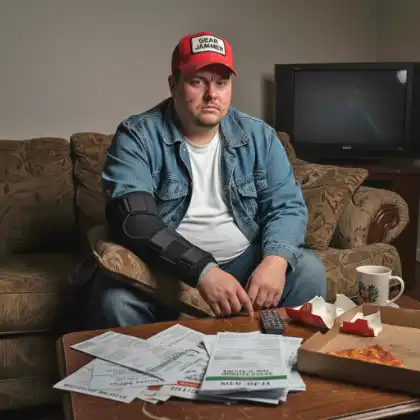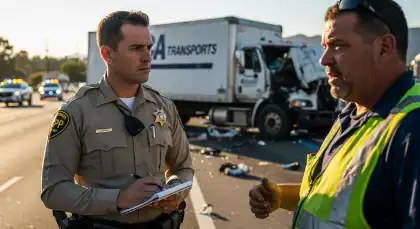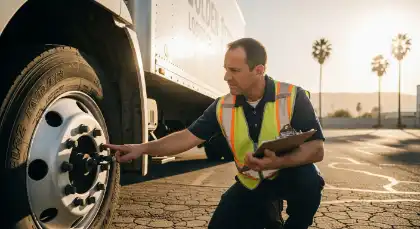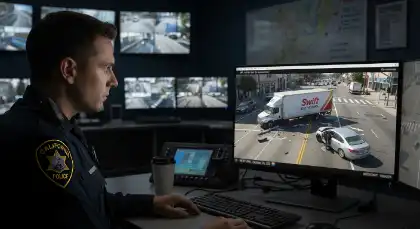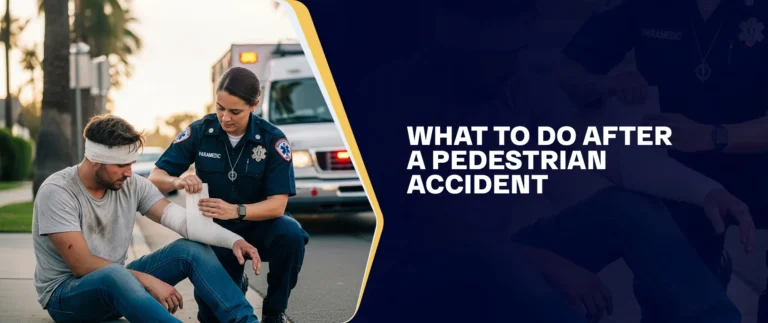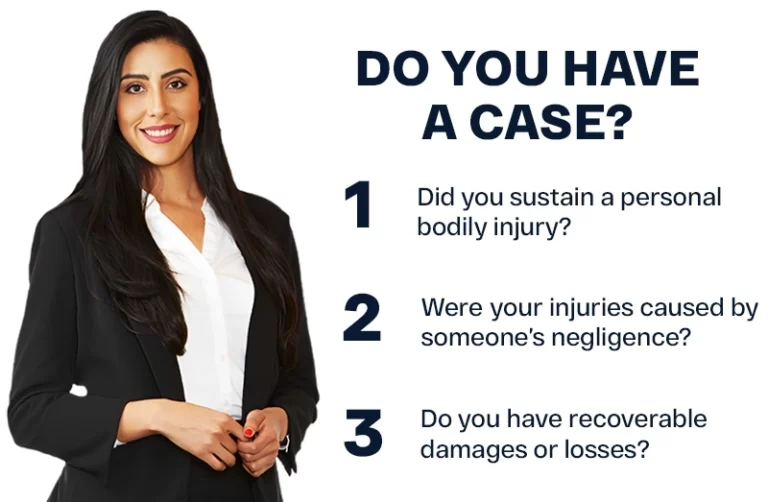TL;DR: If a delivery truck crashes, it can result in injuries and cause significant damage. Victims may be left with medical costs, missed paychecks, and complicated insurance claims as they figure out who may be responsible.
Table of Contents
When a delivery truck crashes, it often causes serious injuries, costly property damage, and legal disputes over who is responsible for the damages. Victims may face hospital bills, lost income, and emotional trauma. Liability can fall on the driver, the delivery company, or other parties, depending on the cause of the accident. After the crash, victims are urged to:
- Determine who caused the crash and how it happened.
- Collect reports, photos, and witness statements.
- File insurance claims for injuries and vehicle damage.
- Track medical expenses and time missed from work.
- Talk to a lawyer about your rights and legal options.
Knowing what to do next can help protect your health, finances, and legal rights. Whether you’re the truck driver, a pedestrian, or another driver, acting quickly can make a difference in how your case moves forward.
Our delivery truck accident lawyers at the AK Law Firm can review your case, explain your legal options, and help you pursue compensation for your losses. Call us at (888) 488-1391 to schedule a free initial consultation.
What To Expect After A Delivery Truck Accident
Delivery truck accidents can be overwhelming for many victims. It’s not just about the crash itself; medical bills, insurance questions, and legal concerns may quickly follow. These situations often involve more than just two drivers. You may need to deal with a delivery company, insurers, and even third parties involved in the truck’s operation.
Safety records indicate that these crashes occur frequently. Between September 2023 and September 2025, UPS was involved in nearly 2,400 crashes across the country. Over 800 of those crashes caused injuries, and close to 70 led to deaths. Many accidents only required the truck to be towed, but the numbers reveal the dangers and sometimes deadly consequences of delivery truck crashes.
Knowing what lies ahead helps you take control of your situation. Here are three key things to know:
Common Injuries
Since delivery trucks are larger and heavier than passenger vehicles, the force of a collision can cause severe harm to those involved in the accident. Victims may suffer injuries that require extensive medical treatment and long recovery periods.
Common bodily injuries include:
- Broken bones
- Brain injuries
- Spinal cord injuries
- Soft tissue injuries
- Internal injuries
- Back injuries
These injuries may limit your ability to work, move, or enjoy everyday life. Many victims face long-term pain, physical limitations, and emotional distress that impact their overall well-being.
Emotional And Mental Health Effects
Many victims struggle with mental health challenges that can affect their relationships, work, and daily routines. They may experience:
- Anxiety & Depression — Feelings of sadness, worry, or hopelessness during recovery.
- Post-Traumatic Stress Disorder (PTSD) — Flashbacks, nightmares, or fear of being on the road again.
- Emotional Withdrawal — Isolation, trouble sleeping, or loss of interest in everyday activities.
These psychological and emotional effects can persist long after the physical wounds have healed. For many, the mental toll of a crash becomes one of the most complex parts of the recovery process.
Financial Burdens
After a delivery truck crash, the money pressures can pile up quickly. Even with insurance, many people face unexpected expenses while still recovering. These costs don’t always appear on a bill; they also impact daily life and family stability.
Some of the financial burdens victims often deal with include:
- Immediate Out-of-Pocket Costs — Paying deductibles, co-pays, or upfront charges before insurance kicks in.
- Ongoing Household Expenses — Covering rent, utilities, childcare, and groceries while income is reduced.
- Debt and Credit Impact — Using credit cards or loans to manage medical or living expenses can lead to long-term debt.
- Job and Career Setbacks — Missing work can hinder promotions, delay career growth, or result in lost opportunities.
- Unexpected Lifestyle Adjustments — Paying for help with childcare, housework, or transportation if injuries limit independence.
For many families, these pressures come all at once and don’t stop just because treatment is ongoing. Recognizing how these burdens impact everyday life is a crucial step in planning for recovery and pursuing legal claims.
If you’re dealing with any of these challenges, a delivery truck accident lawyer can help you seek the damages available in your personal injury case.
Damages Victims May Recover In Delivery Truck Crash Cases
In most delivery truck accident cases, victims pursue compensatory damages. These damages are intended to cover both the financial losses and the personal hardships resulting from the crash. They fall into two main categories: special and general damages.
- Special Damages (Economic Losses) — Special damages compensate victims for measurable financial costs. These damages can often be proven with bills, receipts, or records. Examples include:
- Medical Expenses — Costs for emergency care, hospital stays, surgeries, rehabilitation, and future medical treatment.
- Lost Income — Wages you were unable to earn while recovering from your injuries.
- Loss of Earning Capacity — Reduced ability to work or continue your career due to lasting injuries.
- Property Damage — The cost to repair or replace your vehicle and other belongings damaged in the crash.
- General Damages (Non-Economic Losses) — General damages compensate victims for the intangible but very real impact of the crash. These losses are not tied to receipts but focus on how the accident affects your daily life. They may include:
- Pain and Suffering — Compensation for physical discomfort and ongoing pain from injuries.
- Emotional Distress — Damages for anxiety, depression, PTSD, or other mental health struggles.
- Loss of Enjoyment of Life — When injuries prevent you from taking part in activities or hobbies you once enjoyed.
- Loss of Companionship or Consortium — In wrongful death cases, families may seek damages for the emotional and relational loss of a loved one.
Understanding these categories of damages provides a clearer understanding of the types of damages victims can collect after a truck accident. By recognizing both the financial and personal impacts, you can build a stronger case that reflects the true extent of your losses.
Potentially Liable Parties In A Delivery Truck Accident
One or multiple parties may be legally responsible for a delivery truck crash. Liability depends on what caused the accident and whether someone failed to act safely or follow the law.
Below are the most common parties that could be held liable:
- Truck Driver — They may be held liable if the accident was due to bad driving behavior, such as:
- Speeding
- Drunk driving
- Failure to yield
- Reckless driving
- Running red lights
- Fatigue driving
- These risks highlight why safety studies often track the frequency of accidents involving truck drivers and how driver error remains a leading cause of collisions.
- Trucking Company — The company may be responsible for the driver’s actions while on duty (vicarious liability) or directly at fault for:
- Hiring unqualified or inexperienced drivers.
- Failing to train or supervise drivers properly.
- Pressuring drivers to meet unsafe delivery deadlines.
- Not maintaining or inspecting vehicles as required.
- Cargo Loaders — A third-party company that loads the truck can be liable if poor loading caused the crash. Improper loading includes:
- Overloading the vehicle beyond its weight limit.
- Stacking cargo unevenly or in an unsafe way.
- Failing to secure items, leading to shifting loads or spills.
- Maintenance Providers or Manufacturers — These parties may be held liable if the crash was caused by mechanical problems or defects, such as:
- Auto defects
- Brake failures
- Faulty steering systems
- Worn tires or blowouts
- Government Entities — A local or state agency may be responsible if dangerous road conditions contributed to the crash. These conditions include:
- Large potholes or broken pavement.
- Missing road signs or broken signals.
- Poor lighting, debris, or unsafe construction zones.
- Other Drivers — Another driver on the road may also be at fault, especially in cases where they:
- Cut off the truck or merged unsafely.
- Braked suddenly without warning.
- Drove aggressively, distractedly, or violated traffic laws.
Evaluating liability in a truck accident is essential, but proving it can involve several complex challenges. A truck accident attorney can help you gather evidence and present your claim to insurers or in court.
Legal Challenges In Delivery Truck Crash Cases
Delivery truck accidents can lead to complex legal issues. These incidents are not like typical vehicle crashes. They often involve multiple companies and several insurance policies. There are also disputes over who is responsible for paying the damages. Understanding these challenges can help you prepare your claim and protect your rights.
- Multiple Liable Parties — The truck driver, their employer, cargo loaders, maintenance providers, or other drivers could be liable. Each party will likely have its own insurance company and legal team.
- Conflicting Statements — Witnesses and those involved may provide different accounts of the crash. This can make it difficult to determine what really happened.
- Disputed Employment Status — Trucking companies may argue that the driver wasn’t on duty or didn’t follow company policy. They may do this to limit their liability.
- Missing Key Evidence — Companies may lose or hide vital data. This includes dashcam footage, black box records, and logbooks. Such evidence can be lost, damaged, or intentionally concealed from view.
- Complex Crash Details — Large trucks, heavy cargo, and multi-vehicle collisions make it harder to reconstruct the accident and determine fault.
These legal challenges can complicate the claims process and make it harder to resolve. An experienced truck accident lawyer can gather key evidence, handle complex legal issues, and provide guidance based on the facts of your case.
How Delivery Truck Insurance Works
When a delivery truck is involved in a crash, the insurance process is more complex than in a standard car accident. These trucks are typically covered by commercial policies designed to mitigate the higher risks associated with operating large vehicles.
Here’s how it typically works:
- Identifying The Policies Involved
- The driver may have personal auto coverage.
- The delivery company usually carries a commercial liability policy.
- Other parties, such as cargo loaders or maintenance providers, may also have insurance that applies to this situation.
- Determining Responsibility
- Insurers first look at whether the driver was on duty or off duty.
- They also review whether the company’s safety rules and federal trucking regulations were followed.
- Filing Claims
- Victims usually start by filing a claim with the delivery company’s insurer.
- If multiple parties share fault, claims may need to be filed with more than one insurer.
- Handling Disputes
- Commercial carriers often dispute liability, argue about coverage exclusions, or delay payment.
- Victims may face a longer process compared to a personal auto accident claim.
Delivery truck insurance typically offers higher coverage limits, but the process of obtaining compensation can be more complicated and time-consuming. Successfully navigating this system often requires gathering strong evidence and understanding how multiple insurance policies interact with each other.
Regulatory Oversight And Trucking Industry Standards
Trucking companies and their drivers must adhere to strict federal and state laws. This helps prevent accidents on the road. Failing to follow these rules can impact liability in a personal injury case.
Federal Trucking Regulations (FMCSA Rules)
The Federal Motor Carrier Safety Administration enforces nationwide rules for trucks operating across state lines. These include:
- Hours of Service (HOS) — Drivers can only drive up to 11 hours after having ten consecutive hours off duty. These HOS regulations can help reduce fatigue-related crashes.
- Commercial Driver’s License (CDL) Requirement — Drivers must have a Commercial Driver’s License. This ensures they are qualified to operate giant, heavy vehicles safely.
- Vehicle Inspections & Maintenance — Drivers must perform pre- and post-trip evaluations of equipment condition. Companies must maintain accurate records and promptly address safety issues.
California-Specific Trucking Rules
Trucks in California are subject to additional state laws. Agencies like Caltrans and the California Highway Patrol (CHP) enforce these rules.
- Motor Carrier Permits — Drivers require an MCP to demonstrate they have proper insurance and comply with safety regulations.
- Meal & Rest Break Laws — California requires a 30-minute meal break after five hours of work and a ten-minute rest break every four hours.
- BIT Program — Trucks must pass safety inspections under the Biennial Inspection of Terminals (BIT) program every two years. The CHP checks brakes, tires, lights, and more.
Violations of these federal or state regulations can support a personal injury claim after a crash. If an investigation reveals that a driver or company has failed to comply with these safety standards, they may be held liable for the resulting injuries and losses.
Beyond these rules, many companies adopt additional safety practices, such as defensive driving programs, fatigue-monitoring technology, and stricter cargo-loading procedures, to reduce crash risks and protect both drivers and the public.
Understanding Victims’ Legal Rights
Every victim has the right to pursue justice after a delivery truck crash. This right is available to all individuals, regardless of their race, age, gender, religion, or immigration status. California law protects anyone harmed by another person’s carelessness. Here are some claims an injured victim may file:
- Workers’ Compensation Claim — Injured truck drivers can file a claim for workers’ compensation. This helps them get medical care and some wage replacement. This claim does not require proving fault and is available when the injury occurs during working hours. Workers’ compensation attorneys can help file your claim. They will gather supporting documents to strengthen your case.
- Personal Injury Claim — Victims may file a personal injury claim against the at-fault party to seek compensation for medical expenses, lost income, and other related damages. If the incident involves a driver for a food delivery app, victims may seek help from food delivery accident attorneys who handle these cases.
- Wrongful Death Claim — When a truck crash results in the loss of a loved one, surviving family members may pursue a wrongful death claim. This type of claim can cover expenses like funeral costs, loss of financial support, and the emotional impact of the death. A wrongful death lawyer can guide you through the process and explain your legal options.
Understanding your legal rights after a delivery truck crash helps you take the right steps. Whether you are dealing with injuries, lost income, or the loss of a loved one, knowing your options allows you to pursue compensation available under the law.
How To Establish Liability In A Delivery Truck Accident Case
Proving who is legally responsible in a delivery truck crash is key to recovering damages. Liability depends on whether a party failed to act with reasonable care and whether that failure caused harm.
Here are the two common legal grounds for proving fault:
- Negligence — Negligence is the most common legal basis for establishing liability in a personal injury case. To have a successful claim, you must typically prove that:
- The person or company had a legal duty to act safely (e.g., a driver must follow traffic laws & operate their vehicle safely).
- They failed to meet the required standard of care (e.g., driving while distracted).
- Their actions directly caused the accident.
- You suffered actual harm or loss, including medical expenses, lost wages, pain and suffering, and property damage.
- Vicarious Liability — Under this rule, an employer may be held responsible if an employee causes a crash while performing their job duties.
For example, a delivery company could be liable if a driver caused a crash while making deliveries during work hours. However, shared or independent liability may apply if the driver was off duty or violating company policy.
To prove who was at fault, you need strong evidence. Proper documentation can include:
- Police reports
- Witness statements
- Traffic or dashcam footage
- Black box data
- Driver logs
- Maintenance records
Important note: Most states follow modified comparative negligence, which limits or bars recovery if you’re 50% or more at fault. However, California follows a pure comparative negligence rule, allowing you to recover damages even if you’re found partly at fault for the accident.
Establishing liability can be complicated, especially when multiple parties are involved. This is where understanding what a truck accident lawyer does becomes important. A delivery truck accident lawyer investigates the crash, gathers and preserves evidence, and identifies all potentially liable parties. They also handle insurance negotiations and, if necessary, pursue your case in court to protect your right to compensation.
Time Limits For Filing A Delivery Truck Accident Lawsuit
Each state has different deadlines for filing a lawsuit. In California, the law sets strict deadlines for personal injury cases, including delivery truck crashes. This deadline is commonly referred to as the statute of limitations. You generally cannot pursue a case if you file a lawsuit after the time limit has passed.
Here are the key deadlines:
- Personal Injury Claims — You have two years from the accident date to file a lawsuit for injuries.
- Wrongful Death Claims — If the crash led to the death of a loved one, you generally have two years from the date of death.
- Claims Against Government Entities — If a government vehicle (e.g., a city-owned delivery truck) was involved, you must file an administrative claim with the agency within 6 months after the crash.
Some exceptions can delay the filing deadline. This is known as tolling, which applies when the case involves:
- Injured Minors — The time limit typically starts when the injured child turns 18. A parent or legal guardian can file a claim on the child’s behalf before then.
- Unidentified Defendants — The deadline may be extended if the at-fault party was not immediately known. In these cases, you may file a “John Doe” lawsuit within the original statute of limitations. This type of filing preserves your right to sue. Once the liable driver or party is identified, you can amend the lawsuit to include their name and continue with the case.
Acting within these time limits is critical. Delays can weaken your claim even with tolling and reduce access to key evidence. A car accident lawyer who also handles delivery truck collision cases can review your situation and determine whether any exceptions apply to your case.
How A Delivery Truck Accident Lawyer Can Help
Delivery truck accident claims often involve complex legal issues, including multiple insurance policies and disputes over liability. A lawyer can step in and handle the legal process, allowing you to focus on your healing.
Here’s how they can support your case:
- Investigate the crash and collect evidence.
- Collaborate with accident reconstruction experts to gain a deeper understanding of how the collision occurred.
- Communicate with insurance companies on your behalf.
- Identify potentially liable parties and file claims against each one involved.
- Calculate your losses, including medical expenses, lost wages, and pain & suffering.
- Negotiate a just settlement that reflects the full impact of the crash.
- Represent you in court if the case goes to trial.
While we cannot promise a successful outcome, a truck accident attorney can guide you through the process and address the legal challenges that may arise. They can also explain your options and help you pursue potential compensation available under the law.
For more insight into choosing the right legal support, resources such as “The Elite Guide To Hiring A Truck Accident Lawyer Near You” outline what to look for when selecting representation.
Frequently Asked Questions About Delivery Truck Accident Claims
Many people have questions after a delivery truck crash. The section below addresses common concerns about fault, injuries, and insurance claims. You can contact us for a complimentary case review if you have specific questions about your case.
Who Pays For Damages After A Delivery Truck Crash?
The party that caused the crash, or their insurance company, is usually responsible for paying damages. In delivery truck cases, this could be the driver, the delivery company, a maintenance provider, or even a third-party contractor that assisted with loading the truck. For instance, a trucking company could be found liable for contributing to accident risks.
Studies suggest that time pressure on Amazon delivery drivers may increase accident risks, making company policies a potentially significant factor in liability. Sometimes, more than one insurer may share responsibility depending on how the accident happened.
Do Delivery Companies Have Bigger Insurance Policies Than Car Drivers?
Yes. Delivery companies typically carry commercial insurance policies with much higher coverage limits than regular car insurance. This is because large trucks can cause severe injuries and significant property damage. While this means more funds may be available to cover victims’ losses, dealing with commercial insurers can also involve more disputes and delays.
How Will I Know If The Truck Driver Was At Fault?
A police report gives an initial account of the crash, but rarely the full story. Officers arrive after the fact and rely on statements from the driver, passenger, and witnesses, as well as their observations at the scene. That’s why many people work with a motor vehicle accident lawyer after a delivery truck crash. Truck accident lawyers can dig deeper by:
- Obtaining truck black box data (which displays speed, braking, etc.).
- Reviewing inspection and maintenance records.
- Interviewing eyewitnesses and crash experts.
- Requesting videos from nearby cameras.
This additional investigation can help determine liability and who should be held responsible for your injuries and losses.
Should I See A Doctor Even If I Don’t Feel Hurt?
Yes, it’s advisable to see a doctor as soon as you can. Some injuries take hours or even days to show symptoms. You could have internal bleeding, a concussion, or soft tissue damage and not feel pain right away. Getting checked helps in two ways:
- It protects your health.
- It creates a medical record that links your injuries to the crash.
Even if you feel okay, a medical visit can catch hidden injuries early and support your personal injury claim if you decide to file one.
Should I Accept The Settlement Offer For My Delivery Truck Accident?
It’s best not to accept money or sign anything without consulting a truck accident attorney first. Early offers from insurance companies may not fully cover ongoing medical care, lost income, or other long-term costs. Once you agree to a settlement, you usually cannot request additional compensation later.
Consulting an accident lawyer can help you review the offer and understand whether it reflects your situation. They can also compare it to industry data on the average settlement for semi-truck accidents in similar cases.
What Information Should I Collect After A Truck Accident?
The more details you gather, the stronger your claim will be. If it’s safe to do so, try to do the following:
- Take clear pictures of the crash scene, vehicles, and injuries.
- Request the names and contact information of anyone who witnessed the crash.
- Note the company name, license plate, and DOT number.
- Request a copy of the police report when it’s available.
If the crash involved a food app driver, it is advisable to know what to do after an accident with a food app delivery driver. Even small details can make a big difference once you file your claim or lawsuit. A truck accident attorney can use this information to help protect your legal interests.
What Happens If A Delivery Truck Crashes?
When a delivery truck crashes, it can cause property damage and injuries to people. These trucks are large and heavy, so the impact can be much worse than a regular car crash. Victims often deal with severe injuries, car damage, and stress from what comes next.
Police usually arrive at the scene and create a report that explains what happened and who may be at fault.
Medical teams may also respond. Even so, you should visit a doctor as soon as you can. Some injuries don’t show up immediately, and waiting could affect your recovery and claim.
Insurance companies may reach out to offer a settlement. They do this to close the case fast. Before agreeing to anything, consider consulting with a lawyer who assists truck accident victims. That way, they can review your case and explain what steps to take so you don’t settle for less than what your injuries may be worth.
Get A Free Initial Consultation After A Delivery Truck Crash
Delivery truck accidents can be complicated and overwhelming. You may face serious injuries, insurance delays, or be unsure who is responsible. Our skilled delivery truck accident lawyers are here to guide you every step of the way.
You may call us at (888) 488-1391 or complete our “Do I Have A Case?” form to get a free case evaluation and understand your legal options. During the consultation, you can ask questions about liability, insurance claims, medical costs, or deadlines that may apply to your case.
Our team can also meet you at a convenient location or discuss your case over the phone if traveling is difficult for you. Our truck accident lawyers assist clients across California, providing legal services regardless of background, immigration status, or language spoken.

